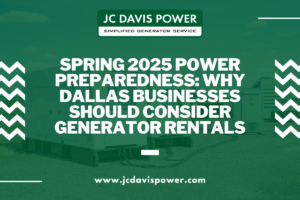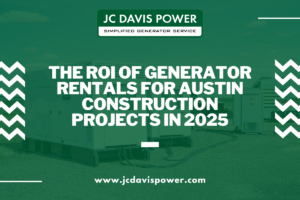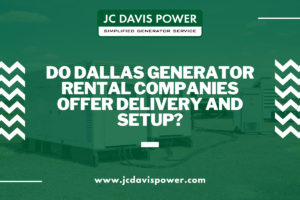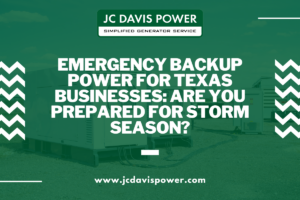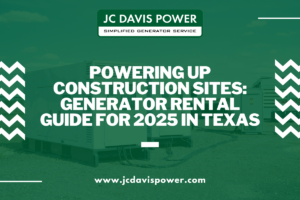Key Takeaways
- Dallas businesses face significant power reliability challenges with Texas experiencing 263 outages from 2019-2023, more than any other state
- Generator rentals offer financial flexibility and scalability compared to purchasing, with lower upfront costs and maintenance responsibilities
- Early planning for spring 2025 power backup needs is crucial as seasonal demand peaks coincide with higher severe weather risks
- Custom power solutions provide critical business continuity during outages that cost Dallas companies thousands per hour of downtime
- Local generator rental partners offer expertise specific to Dallas power challenges and emergency response capabilities
Remember the May 2024 storms that left over 540,000 Dallas-Fort Worth customers in the dark? Some businesses were down for days while others kept their doors open, serving customers and maintaining operations despite the widespread outage. What made the difference? Preparedness.
As Dallas businesses look ahead to spring 2025, the question isn’t if power disruptions will occur, but when—and more importantly, whether your business will be ready when they do. With Texas leading the nation in both frequency and duration of power outages, having a robust backup power strategy isn’t just good planning—it’s essential for survival.
Why Dallas Faces Unique Power Grid Challenges
The Alarming Statistics Behind Texas Power Outages
The numbers paint a concerning picture for Dallas business owners. Texas experienced 263 power outages from 2019 to 2023—more than any other state—with each outage lasting an average of 160 minutes and affecting approximately 172,000 residents per incident (Payless Power analysis of Department of Energy data, 2024).
This isn’t just bad luck. Texas has reported 210 major outages caused by severe weather between 2000 and 2023, making it the most affected state in the U.S (KQVT, 2024). For Dallas businesses, these aren’t just statistics—they represent real operational disruptions, revenue losses, and customer frustrations.
How reliable is the Texas power grid during severe weather events?
Weather-related events trigger 58% of all Texas power outages, with winter storms accounting for 23% and tropical cyclones responsible for another 14% (KQVT, 2024). Spring in Dallas brings particular concern as it ushers in tornado season, thunderstorms, and flooding—all potential triggers for widespread outages.
The Economic Impact of Power Disruptions
For Dallas businesses, power outages aren’t just inconvenient—they’re expensive. Depending on your industry and size, a single hour of downtime can cost anywhere from several thousand to hundreds of thousands of dollars. Beyond immediate revenue loss, power outages can damage equipment, spoil inventory, disrupt critical data systems, and erode customer trust.
Consider these business impacts:
| Industry | Hourly Cost of Downtime | Common Damages During Outages |
| Retail | $3,000-$7,000 | Lost sales, refrigeration failures, security risks |
| Restaurants | $2,000-$5,000 | Food spoilage, customer turnaway, safety issues |
| Manufacturing | $15,000-$50,000+ | Production stoppage, equipment damage, restart costs |
| Healthcare | $8,000-$700,000 | Patient safety risks, equipment failures, data concerns |
| Data Centers | $9,000-$11,000 per minute | System crashes, data loss, service interruptions |
As one Dallas restaurant owner discovered during the May 2024 storms, having a generator rental agreement in place meant the difference between $20,000 in spoiled inventory and a busy weekend serving customers who couldn’t find open restaurants elsewhere.
The Business Case for Generator Rentals vs. Purchasing
Financial Advantages of the Rental Model
When it comes to emergency power solutions in Dallas, businesses face a fundamental choice: purchase a generator outright or establish a generator rental relationship. While ownership might seem appealing, the rental model offers compelling advantages for most businesses:
- Lower initial investment: Quality commercial generators cost $10,000-$50,000+ to purchase, while rental agreements require no major capital outlay
- Maintenance responsibility shifts to the provider: Avoiding service contracts, parts replacement, and testing costs
- Tax benefits: Rental costs are typically fully deductible business expenses rather than depreciating capital assets
- No storage or security concerns: No need to dedicate valuable space to equipment that sits idle most of the time
For small to mid-sized Dallas businesses especially, these financial considerations make generator rentals the more practical solution for spring 2025 power backup planning.
Flexibility for Seasonal and Variable Power Needs
Perhaps the most compelling advantage of generator rentals is the flexibility they provide. Seasonal generator demand in Dallas typically peaks during spring storm season and summer cooling periods. Why invest in permanent equipment sized for your maximum need when you could right-size your rental for each specific situation?
With generator rentals, businesses can:
- Adjust power capacity based on current operations
- Scale up during high-risk weather periods
- Deploy generators only when and where needed
- Upgrade to newer technology without selling outdated equipment
- Test different configurations before making permanent decisions
This adaptability proves particularly valuable for businesses with seasonal operations, fluctuating power requirements, or multiple locations throughout Dallas.
Building Generator Rentals Into Your Business Continuity Plan
Assessing Your Critical Power Requirements
Effective business continuity planning starts with understanding exactly what your operation needs to keep running during an outage. While every business differs, your assessment should include:
- Identifying critical systems: Which functions absolutely cannot go down? (Point-of-sale systems, security, refrigeration, medical equipment, servers, etc.)
- Calculating load requirements: How much power (in kW) do these systems require? This determines generator sizing.
- Determining fuel requirements: How long should backup power operate? 24 hours? 72 hours? A week?
- Listing safety considerations: Are there regulations specific to your industry regarding backup power?
- Planning for deployment logistics: Where will the generator be placed? Who will coordinate delivery and connection?
What size generator does my Dallas business need during power outages?
Generator sizing depends on your specific electrical load, but as a general guideline, small retail shops might need 20-50kW, mid-sized restaurants 60-150kW, and larger manufacturing facilities 200kW or more. A professional assessment from a reputable generator rental Dallas provider ensures you get precisely what you need—not more, not less.
Integration With Existing Emergency Procedures
The best business continuity plans don’t treat backup power as an afterthought but as a central component of emergency response. Generator rentals should be integrated into your broader emergency procedures with clearly defined:
- Roles and responsibilities during power disruptions
- Communication protocols for staff, customers, and vendors
- Generator delivery and connection processes
- Regular testing and drill schedules
- Contingency plans for various outage scenarios
Selecting the Right Generator Rental Partner in Dallas
Essential Provider Qualities
Not all generator rental Dallas providers offer the same level of service. When evaluating potential partners for your spring 2025 power backup needs, prioritize:
- Local expertise: Providers familiar with Dallas’s specific power challenges and weather patterns
- Response time guarantees: How quickly can they deliver and set up your generator during an emergency?
- Equipment variety and quality: Do they offer the right sizes and types for your needs, with modern, well-maintained units?
- 24/7 service support: Power outages don’t follow business hours—neither should your generator service
- Fuel management options: Will they handle refueling during extended outages?
- Demonstrated reliability: Ask for references from similar businesses in Dallas
A partnership with a trusted local provider like JC Davis Power delivers peace of mind that goes beyond the equipment itself.
Understanding Rental Terms and Agreements
Before finalizing any rental agreement for emergency power solutions Dallas, ensure you understand:
Common Rental Structures:
- Short-term emergency rentals (1-7 days)
- Seasonal arrangements (1-3 months during high-risk periods)
- Long-term contracts with dedicated equipment
- On-call agreements with prioritized service
Key Contract Points to Clarify:
- Delivery timeframe guarantees
- Setup and connection services included
- Maintenance responsibilities
- Testing procedures
- Early termination options
- Fuel supply arrangements
- Technical support availability
“The fine print matters. When our building lost power during last spring’s storms, having a service-inclusive contract meant the rental company handled everything from delivery to connection to ongoing fuel.”
Market Trends Supporting the Generator Rental Shift
Growing Adoption Across Industries
The generator rental market is experiencing notable growth, reflecting businesses’ increasing recognition of power resilience needs. The U.S. generator rental market was valued at $2.58 billion in 2023 and is projected to grow at a CAGR of 3.85% through 2029 (ResearchAndMarkets.com, 2024).
This growth isn’t happening by accident. Businesses are responding to:
- Increasing power outage frequency and severity
- Rising costs of downtime
- Growing customer expectations for uninterrupted service
- Regulatory requirements in certain sectors
- The proven cost-effectiveness of the rental model
The construction sector currently leads generator rental adoption, but healthcare, retail, hospitality, and data services are rapidly increasing their usage of flexible power solutions.
Dallas-Specific Adoption Factors
For Dallas businesses specifically, several factors make generator rentals increasingly attractive:
- Texas’s deregulated power market and associated stability challenges
- The metro area’s continued rapid growth straining existing infrastructure
- Climate pattern changes increasing severe weather frequency
- Rising commercial property costs making dedicated generator storage costly
- The expanding network of qualified local providers offering improved service models
Forward-thinking Dallas business leaders are responding to these trends by incorporating generator rentals into their standard operating procedures rather than treating them as exceptional emergency measures.
Your Spring 2025 Power Preparedness Roadmap
Timeline for Effective Planning
Preparing for spring 2025 power needs requires advance planning. Follow this timeline to ensure your business isn’t caught unprepared:
6+ Months Before (Now):
- Conduct a power vulnerability assessment
- Research and select generator rental partners
- Develop initial power requirements documentation
- Contact potential providers for consultations
3-6 Months Before:
- Finalize generator specifications and requirements
- Establish rental agreements and terms
- Create staff training materials
- Plan for generator placement and connections
1-3 Months Before:
- Conduct staff training on emergency procedures
- Test connection points and interfaces
- Review and update emergency contact lists
- Confirm delivery logistics with rental provider
Spring 2025 (High-Risk Season):
- Implement heightened weather monitoring
- Maintain open communication with rental provider
- Activate pre-established emergency protocols when necessary
Staff Training and Preparation
The best equipment is only as effective as the people operating it. Ensure your team knows:
- How to recognize when backup power should be activated
- Who to contact to initiate generator delivery
- Basic safety procedures around generator operation
- Which systems will and won’t have power during an outage
- How to manage customer expectations during power transitions
- Troubleshooting procedures for common issues
Consider partnering with your generator rental provider for staff training sessions to ensure everyone understands the equipment and procedures.
Conclusion: Power Certainty in Uncertain Times
As Dallas businesses face the increasingly unpredictable power landscape of spring 2025, generator rentals offer a flexible, cost-effective solution that aligns precisely with the challenges at hand. Rather than investing heavily in rarely-used assets, the rental model provides scalable, professional-grade power solutions exactly when and where they’re needed most.
With Texas consistently leading the nation in power outages and severe weather events, the question isn’t whether your business needs a backup power plan, but what form that plan should take. For most Dallas businesses, the answer increasingly points toward strategic generator rental partnerships that provide both financial and operational advantages.
Don’t wait until the forecast turns threatening to consider your power backup strategy. The businesses that thrive through disruption are those that prepared months in advance. Start your generator rental Dallas planning today to ensure your operations remain powered, productive, and profitable through whatever challenges spring 2025 brings.
FAQ: Generator Rentals for Dallas Businesses
How quickly can a rental generator be delivered during an emergency power outage?
Most reputable Dallas generator rental companies can deliver emergency units within 2-4 hours of receiving your call, depending on weather conditions and your location within the metro area. However, businesses with pre-established rental agreements typically receive priority service, potentially cutting delivery time in half. For critical operations, some providers offer dedicated equipment options with guaranteed response times as short as 60-90 minutes.
What size generator will my Dallas business need during a power outage?
Your generator size depends on your specific electrical requirements. As a general guideline, small offices typically need 20-50kW, medium retail locations 50-150kW, and larger facilities 200kW+. The most accurate approach is having a power load assessment performed by a qualified professional who will analyze your electrical panels, critical equipment, and operational requirements. This ensures you rent equipment that provides sufficient power without paying for unnecessary capacity.
Can generator rentals power my entire business, or just essential systems?
This depends entirely on your choice and budget. Generator rentals can be configured to power your entire facility or only critical systems. Many businesses opt for a middle approach: powering essential operations (refrigeration, security, critical machinery, point-of-sale systems) plus limited lighting and climate control. Your rental provider can help design a solution that balances power needs against rental costs for the optimal configuration.
How does the generator rental process work during emergency situations in Dallas?
For businesses with established rental agreements, the process typically works as follows: You call the emergency number provided by your rental partner, confirm your pre-established requirements, and receive an estimated delivery time. The provider delivers the generator, handles the connection to your building’s electrical system (either through a pre-installed transfer switch or manual connections), tests the system, and provides basic operational instructions. Throughout the rental period, they’ll handle maintenance and refueling as needed, then remove the equipment once utility power is restored.
What makes generator rentals more cost-effective than purchasing for most Dallas businesses?
Generator rentals eliminate the substantial capital investment of purchasing ($10,000-$100,000+), transfer the maintenance and testing responsibilities to the provider, avoid depreciation concerns, and enable businesses to access exactly the right size equipment for each specific situation. Additionally, rental costs are typically 100% tax-deductible as business expenses, whereas purchased generators must be depreciated over time. For businesses that might need backup power only a few times yearly, rental costs over 5-7 years typically remain lower than purchase, installation, maintenance, testing, and eventual replacement costs.
